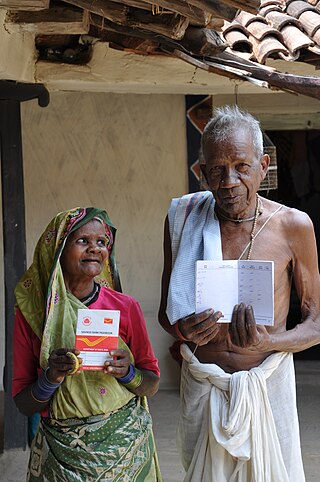Related Research Articles

Social services are a range of public services intended to provide support and assistance towards particular groups, which commonly include the disadvantaged. They may be provided by individuals, private and independent organisations, or administered by a government agency. Social services are connected with the concept of welfare and the welfare state, as countries with large welfare programs often provide a wide range of social services. Social services are employed to address the wide range of needs of a society. Prior to industrialisation, the provision of social services was largely confined to private organisations and charities, with the extent of its coverage also limited. Social services are now generally regarded globally as a 'necessary function' of society and a mechanism through which governments may address societal issues.

Welfare, or commonly social welfare, is a type of government support intended to ensure that members of a society can meet basic human needs such as food and shelter. Social security may either be synonymous with welfare, or refer specifically to social insurance programs which provide support only to those who have previously contributed, as opposed to social assistance programs which provide support on the basis of need alone. The International Labour Organization defines social security as covering support for those in old age, support for the maintenance of children, medical treatment, parental and sick leave, unemployment and disability benefits, and support for sufferers of occupational injury.
Welfare reforms are changes in the operation of a given welfare system aimed at improving the efficiency, equity and administration of government assistance programs. Reform programs may have a various aims, sometimes the focus is on reducing the number of individuals receiving government assistance and welfare system expenditure, at other times reforms may aim to ensure greater fairness, effectiveness and allocation of welfare for those in need. Classical liberals, libertarians, and conservatives generally argue that welfare and other tax-funded services reduce incentives to work, exacerbate the free-rider problem, and intensify poverty. On the other hand social democrats and socialists generally criticize welfare reforms that minimize the public safety net and strengthens the capitalist economic system. Welfare reform is constantly debated because of the varying opinions on a government's need to balance providing guaranteed welfare benefits and promoting self-sufficiency.
Guaranteed minimum income (GMI), also called minimum income, is a social-welfare system that guarantees all citizens or families an income sufficient to live on, provided that certain eligibility conditions are met, typically: citizenship; a means test; and either availability to participate in the labor market, or willingness to perform community services.

The Department for Work and Pensions (DWP) is a United Kingdom government department of His Majesty's Government responsible for welfare, pensions and child maintenance policy. As the UK's biggest public service department it administers the State Pension and a range of working age, disability and ill health benefits to around 20 million claimants and customers. It is the second largest governmental department in terms of employees, and the largest in terms of expenditure (£187bn).

The Rehabilitation Act of 1973 is a United States federal law, codified at 29 U.S.C. § 701 et seq. The principal sponsor of the bill was Rep. John Brademas (D-IN-3). The Rehabilitation Act of 1973 replaces preexisting laws to extend and revise the authorization of grants to States for vocational rehabilitation services, with special emphasis on services to those with the most severe disabilities, to expand special Federal responsibilities and research and training programs with respect to individuals with disabilities, to establish special responsibilities in the Secretary of Health, Education, and Welfare for coordination of all programs with respect to individuals with disabilities within the Department of Health, Education, and Welfare, and for other purposes.

The Ministry of Home Affairs, or simply the Home Ministry, is a ministry of the Government of India. It is mainly responsible for the maintenance of internal security and domestic policy. It is headed by Minister of Home Affairs.

The Ministry of Agriculture & Farmers Welfare, formerly the Ministry of Agriculture, is a branch of the Government of India and the apex body for formulation and administration of the rules and regulations and laws related to agriculture in India. The three broad areas of scope for the Ministry are agriculture, food processing and co-operation. The agriculture ministry is headed by Minister of Agriculture and Farmers' Welfare which is currently held by Narendra Singh Tomar. Kailash Choudhary and Shobha Karandlaje are the Ministers of State. Sharad Pawar, serving from 22 May 2004 to 26 May 2014, has held the office of Minister of Agriculture for the longest continuous period till date.
Social security, in Australia, refers to a system of social welfare payments provided by Australian Government to eligible Australian citizens, permanent residents, and limited international visitors. These payments are almost always administered by Centrelink, a program of Services Australia. In Australia, most payments are means tested.
Social security in India includes a variety of statutory insurances and social grant schemes bundled into a formerly complex and fragmented system run by the Indian government at the federal and the state level. The Directive Principles of State Policy, enshrined in Part IV of the Indian Constitution reflects that India is a welfare state. Food security to all Indians are guaranteed under the National Food Security Act, 2013 where the government provides highly subsidised food grains or a food security allowance to economically vulnerable people. The system has since been universalised with the passing of The Code on Social Security, 2020. These cover most of the Indian population with social protection in various situations in their lives.

The National Social Assistance Programme (NSAP) is a Centrally Sponsored Scheme of the Government of India that provides financial assistance to the elderly, widows and persons with disabilities in the form of social pensions. The NSAP scheme only includes Below Poverty Line individuals as beneficiaries.

The National Disability Insurance Scheme (NDIS) is a scheme of the Australian Government that funds costs associated with disability. The scheme was legislated in 2013 and went into full operation in 2020. Its introduction followed the 15 month long 'Make It Real' campaign which involved community forums, visits to MPs, the holding of a National Disability and Carer Congress, 'Disabilitea' gatherings, and rallies involving 20,000 people. The scheme is administered by the National Disability Insurance Agency (NDIA) and overseen by the NDIS Quality and Safeguards Commission. Bill Shorten provides ministerial oversight as Minister for the National Disability Insurance Scheme.
Direct Benefit Transfer or DBT is an attempt to change the mechanism of transferring subsidies launched by Government of India on 1 January 2013. This scheme or program aims to establish a Giro system to transfer subsidies directly to the people through their linked bank accounts. It is hoped that crediting subsidies into bank accounts will reduce leakages, duplicity and delay and the new processes will increase transparency and accountability.

Pakistan Bait-ul-Mal (PBM) is a charity and social welfare organisation to help the poor and needy in Pakistan. PBM is a semi-autonomous body set up through a 1992 Act of the Government of Pakistan.
Centrally Sponsored Schemes (CSS) are schemes that are implemented by state governments of India but are largely funded by the Central Government with a defined State Government share. Some examples of such schemes are Mahatma Gandhi National Rural Employment Guarantee Act, Pradhan Mantri Gram Sadak Yojana,seekho aur kamao yojana
Rashtriya Uchchattar Shiksha Abhiyan (RUSA) is a holistic scheme of development for higher education in India initiated in 2013 by the Ministry of Education, Government of India. The centrally sponsored scheme aims at providing strategic funding to higher educational institutions throughout the country. Funding is provided by the central ministry through the state governments and union territories (UT), which in coordination with the central Project Appraisal Board will monitor the academic, administrative and financial advancements taken under the scheme. A total of 316 state public universities and 13,024 colleges will be covered under it.
Rashtriya Madhyamik Shiksha Abhiyan (RMSA) is a centrally sponsored scheme of the Ministry of Human Resource Development, Government of India, for the development of secondary education in public schools throughout India. It was launched in March 2009. The implementation of the scheme has started from 2009-2010 to provide conditions for an efficient growth, development and equity for all. The scheme includes a multidimensional research, technical consulting, various implementations and funding support. The principal objectives are to enhance quality of secondary education and increase the total enrollment rate from 52% to 75% in five years, i.e. from 2009–2014. It aims to provide universal education for all children between 15–16 years of age. The funding from the central ministry is provided through state governments, which establish separate implementing agencies. The total budget allocated during the XI Five Year Plan (2002-2007) was ₹2,012 billion (US$25 billion).
The Social Welfare Department is a department of the Hong Kong Government responsible for providing welfare services to the community.
The Department of Agriculture and Farmers' Welfare (DA&FW) is one of the three constituent department of Ministry of Agriculture and Farmers' Welfare, the other two being Department of Agriculture Research and Education (DARE) and Department of Animal Husbandry and Dairying. The Department is headed by Minister of Agriculture and Farmers' Welfare.
References
- ↑ "National Scheme of Welfare of Fishermen - SuNews" . Retrieved 2021-12-15.
- ↑ "Centrally Sponsored National Scheme of welfare of Fishermen | Department of Animal Husbandry & Dairying". dahd.nic.in. Retrieved 2021-12-15.
- ↑ "National Scheme of Welfare of Fishermen". GovInfo.me. 2016-07-28. Retrieved 2021-12-15.
- ↑ "Govt. of India's Pattern of Assistance under Welfare of Fishermen - I & II". fisheries.mizoram.gov.in. Retrieved 2021-12-15.
- ↑ "10 important government schemes in Agriculture sector". India Today. August 30, 2019. Retrieved 2021-12-15.
- ↑ "India Wants a 'Blue Revolution'. What Do India's Fishers Want?". The Wire. Retrieved 2021-12-15.